MOVIES
Switzerland, 2010, 40 min
Sarah Bregy
28.01.2011 18:10
In Tamil Culture the parents are traditionally responsible to find a suitable marrige partner for their children. “Love warriages” exist as well, but are less accepted in society. Sri Lanka people, who migrate to Europe, often continue the tradition of the “arranged marriage”. That means, that young Tamils, who grew up in a western society, get confronted with contrasting ideals concerning marriage.
The ethnographic documentary “Arranged love” discusses, based in three portraits, different ways of young Sri Lankan couples to deal with that issue. The film shows different point of views, what conflicting situations can emerge and what opinions the couples hold on western ways of love amd marriage.
Director, production, camera, edit: Sarah Bregy
Born in 1981 in Switzerland. 2003-2010 she studied at the University of Zurich in Cultural Anthropology, Cinema Studies and Political Sciences.
Language of dialogues: Swissgerman, Tamil
Language of subtitles:Czech, English
USA, 2010, 15 min
Jacob Griswold, Javi Aitor Zubizarreta
29.01.2011 16:50
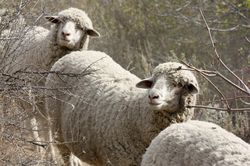 High up in the hills of Idaho, USA. Immigrants earn their wages in solitude as the quiet caretakers of thousand of serene sheep.
High up in the hills of Idaho, USA. Immigrants earn their wages in solitude as the quiet caretakers of thousand of serene sheep.
Director, Camera, Edit: Jacob Griswold, Javi Aitor Zubizarreta
Griswold and Zubizarreta were born in 80´s in USA. They studied at the Notre Damme University of Utah. Artzainak is their first film.
Production: Griswold an Zubizarreta Productions, Spain
Language of dialogues: English, Spanish
Language of subtitles: Czech, English
European premiere!!!
Hungary, 2007, 41 min
Kriszta Bódis
28.01.2011 21:40
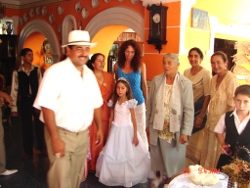 “A man is different from a woman. A man is allowed to do more things, a woman to do nothing.” say Oláh gypsies from Békés County Hungary. Traditions based on these kinds of suppositions keep this community firm. Grown Girl means: Mature Woman. Becoming Grown Girl is a turning point.”
“A man is different from a woman. A man is allowed to do more things, a woman to do nothing.” say Oláh gypsies from Békés County Hungary. Traditions based on these kinds of suppositions keep this community firm. Grown Girl means: Mature Woman. Becoming Grown Girl is a turning point.”
‘Báriséj’ – is a gender documentary showing gender roles of an oláh gypsy community with its unique laws and traditions for women with their own interpretations.
Director: Kriszta Bódis
Born in Budapest in 1967. She is a writer, documentary-film director, psychologist.
Production: FILMPLUS, Budapest, Hungary
Camera: Francisco Gózon, Márton Vízkelety, Mária Takács
Language of dialogues: Hungarian
Language of subtitles: English
Belgium, 2011, 15 min
Petar Veljacic
28.01.2011 22:40
Culturally, we are all governed to live in and reproduce two-gender societies, taking a gender role „naturaly“ assigned by biological sex. Some discoveries disagree.
Director, Production, Camera, Edit: Petar Veljacic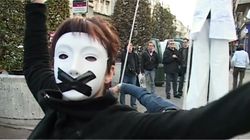
Petar was born 1979 in Aleksinac, Yugoslavia. Graduated at the University of Belgrade, Faculty of Philosophy, Department of Ethnology and Anthropology on a topic History and perspectives of Visual Anthropology . His film education started in film school of Academy Film Center in Belgrade and further developed through various productions in the field of visual anthropology and observational filming. His video activist work begun in Brussels, where he is living and working since 2009.
Language of dialogues: English, French
Language of subtitles: English
Switzerland/Cambodia, 2010, 50 min
Tommi Mendel, Brigitte Nikles
28.01.2011 19:10
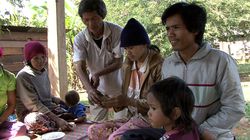 On the basis of a social anthropological case study, this film documents the birth practices of the Bunong in Mondulkiri province, located in the northeast of Cambodia. Social, economic and political changes are transforming the province tremendously and are affecting villagers´ beliefs, perceptions and habits regarding pregnancy, delivery and early motherhood. Traditional midwives, pregnant women, mothers and their families give a personal insight into their present decision-making strategies, which are at the crossroads between tradition and modernity.
On the basis of a social anthropological case study, this film documents the birth practices of the Bunong in Mondulkiri province, located in the northeast of Cambodia. Social, economic and political changes are transforming the province tremendously and are affecting villagers´ beliefs, perceptions and habits regarding pregnancy, delivery and early motherhood. Traditional midwives, pregnant women, mothers and their families give a personal insight into their present decision-making strategies, which are at the crossroads between tradition and modernity.
Directors: Tommi Mendel, Brigitte Nikles
Tommi and Brigitte both studied Anthropology at the University of Zurich. Currently Brigitte is working in Mondulkiri in Cambodia to establish a Bunong Cultural Centre and Tommi is working on his PhD with the means of Ethnographic Film.
Production: Tigertoda productions, Zurich, Switzerland
Camera, Edit: Tommi Mendel
The movie was projected on various world film festivals (selection):
NAFA International Ethnographic Film Festival, Aarhus, Denmark 2010
International Festival of Visual Anthropology Mediating Camera, Moscow, Russia 2010
Cambodia International Film Festival, Phom Phen, Cambodia 2010
International Festival of Ethnological Film, Belgrade, Serbia 2010
Contro-Sguardi International Anthropological Film Festival, Perugia, Italy 2010
Athens Ethnographic Film Festival, Greece 2010
Language of dialogues: Bunong, Khmer
Language of subtitles:Czech, English
Czech Republic, 2010, 57 min
Tomáš Kubák
29.01.2011 14:40
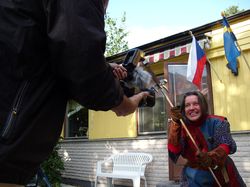 This documentary film is an insight into the lives of eight Czech families or individuals living permanently in Sweden. What has this country given them or taken away? What are their views on leaving Czechoslovakia and living in the North after forty years? How do they and their children who were born here perceive Sweden and the Swedish society? The film does not only peek inside the Czech families but also reveals the atmosphere of Swedish towns and villages and tinges everything with original Czech and Swedish music.
This documentary film is an insight into the lives of eight Czech families or individuals living permanently in Sweden. What has this country given them or taken away? What are their views on leaving Czechoslovakia and living in the North after forty years? How do they and their children who were born here perceive Sweden and the Swedish society? The film does not only peek inside the Czech families but also reveals the atmosphere of Swedish towns and villages and tinges everything with original Czech and Swedish music.
Director, camera, edit: Tomáš Kubák
Tomáš Kubák is a typographer, cameraman and director of travel films. He is cooperated with International Czech Club and make documents about Czech abroad.
Production Martina Fialková, Mezinárodní český klub,o.s., Czech Republic
Language of dialogues: Czech
Language of subtitles: No subtitles
Switzerland, 2010, 50 min
Lea Furrer
29.01.2011 18:55
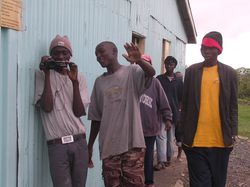 Anthony and Robert – youngsters from Nairobi – give insight into their everyday life. With a film camera they document and comment the life on the streets and in the Halfway Centre. Thereby, not only their trials and tribulations are expressed but also their sense of humor and their plans for the future, which are full of hope: Moving images which convince through their authenticity. By handing over the camera to the two protagonist, a dynamic change of perspectives is established. This renders possible a differentiated examination of the subject matter as well as the proceedings of the film.
Anthony and Robert – youngsters from Nairobi – give insight into their everyday life. With a film camera they document and comment the life on the streets and in the Halfway Centre. Thereby, not only their trials and tribulations are expressed but also their sense of humor and their plans for the future, which are full of hope: Moving images which convince through their authenticity. By handing over the camera to the two protagonist, a dynamic change of perspectives is established. This renders possible a differentiated examination of the subject matter as well as the proceedings of the film.
Director, Production, Edit: Lea Furrer
Lea was born in 1984 in Switzerland, raised in Switzerland and three years in Brazil. MA in Social Anthroplogy, Film Studies and Social Pedagogy at he University of Zurich. The film Chokora was a part of her master thesis in social anthropology. Actually, she is working as a social education worker with children and young people in Zurich.
Camera: Lea Furrer, Anthony Mutinda, Robert Oundo
Language of dialogues:English, Swahili, Sheng
Language of subtitles: Czech, English
Norway, Macedonia, 2010, 35 min
Frode Storaas, Elizabeta Koneska
29.01.2011 20:05
 Filip is a student at Mac Brod Gymnasium. He stays at the dormitory. Alija is a good friend of him at school. But they relate to different religions and that separate them not only during lunch-breaks at school, but all the time outside school. Filip spends his weekends in his home village Samokov, collecting mushrooms for sale and helping his grandparents and his mother in her small shop. Alija commutes everyday from his home village Plasnica.
Filip is a student at Mac Brod Gymnasium. He stays at the dormitory. Alija is a good friend of him at school. But they relate to different religions and that separate them not only during lunch-breaks at school, but all the time outside school. Filip spends his weekends in his home village Samokov, collecting mushrooms for sale and helping his grandparents and his mother in her small shop. Alija commutes everyday from his home village Plasnica.
The film hints on the situation in Macedonian countryside where unemployment forces people to leave the villages. This situation of dejection shadows the relationships between ethnic and religious groups.
Director, Camera: Frode Storaas, Elizabeta Koneska
As an anthropologist Storaas has worked with pastoralists and agro-pastoralists in Sudan, Kenya, Uganda and Ethiopia. General anthropology, i.e. adaptation, economy and politics, has been his main concern.
As a filmmaker he has been involved in projects in Africa and the Middle East, in Greece and Macedonia, in Mexico and USA, in China and in Norway. A theme conveyed in some of these projects has been magic, how magical beliefs may influence everyday life.
Koneska is a senior curator at the National Museum of Macedonia in Skopje, ethnology department. Her main topics of research and scientific relates to: traditional food; coppersmith and tinsmith crafts; Slavic Orthodox community in Istanbul; Shared Shrines; Turkish and other Muslims ethnic and religious community’s.
Koneska has directed 12 films based on research in Macedonia and Turkey.
Production: Macedonian Centre for Photography, Skopje, Macedonia
Edit: Frode Storaas
Language of dialogues: Macedonian, English
Language of subtitles: Czech, English
Czech Republic, 2010, 25 min
Martin Šmoldas
29.01.2011 16:10
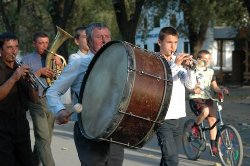 The compatriotic village of Holuboje was founded in the so called Bessarabia (part of today’s Moldavia) by Czech colonists in 1864. Holuboj compatriots managed to preserve aspects of their language and folk culture, often long forgotten in the Czech Republic, in the manifold national variety of this region. The most extraordinary of all is the folk band which has continuously functioned here for incredible 146 years and which has various Czech songs in its repertoire.
The compatriotic village of Holuboje was founded in the so called Bessarabia (part of today’s Moldavia) by Czech colonists in 1864. Holuboj compatriots managed to preserve aspects of their language and folk culture, often long forgotten in the Czech Republic, in the manifold national variety of this region. The most extraordinary of all is the folk band which has continuously functioned here for incredible 146 years and which has various Czech songs in its repertoire.
Despite these folk singularities, local people are afflicted with the same problems as all the people of the isolated and poor Moldavia. The decline in economics, disintegration of agricultural co-operatives and everyday existential problems endanger the existence of this folk band. The author of the film introduces four protagonists, inhabitants of Holuboj, who provide an insight into the past and present lives of compatriots in Moldavia.
Director, production, camera, edit: Martin Šmoldas
Martin is a student of Social Anthropology at the University of Pardubice. He is interests in the field in Moldova.
Language of dialogues: Czech
Language of subtitles: No subtitles
Premiere!!!
Czech Republic, 2010, 26 min
Jiřina Kosíková
29.01.2011 14:00
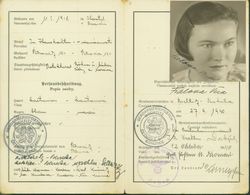 Věra Fialová was born at the end of the First World War as the out-of-wedlock child of a Czech woman and a Polish man, a Russian prisoner of war. In an old suitcase she keeps her old letters and pictures from the First and Second World Wars. Her memoirs, accompanied by songs from her family repertoire, capture the "small history" - the life story of an "ordinary woman" against the backgraound of the great historical events of the 20th century.
Věra Fialová was born at the end of the First World War as the out-of-wedlock child of a Czech woman and a Polish man, a Russian prisoner of war. In an old suitcase she keeps her old letters and pictures from the First and Second World Wars. Her memoirs, accompanied by songs from her family repertoire, capture the "small history" - the life story of an "ordinary woman" against the backgraound of the great historical events of the 20th century.
An edited document taken as part of ethnological field research in 2007 and 2009. The Film was produced as part of the research project of the Institute of Ethnology of the Academy of Sciences of the Czech Republic, v.v.i. Prague "Cultural Identity and Cultural Regionalism in the Process of Shaping European Ethnic Patterns" (reg. number AV0Z90580513).
The director Jiřina Kosíková (*1952) works as ethnologist at the Institute of Ethnology at the Academy of Science of the Czech Republic, v.v.i. Prague - Department Brno. Specialisation: Visual Anthropology. Use of video recording as an ethnological field research method and technique.
Production:Institute of Ethnology at the Academy of Science of the Czech Republic, Veveří 97, 602 00 Brno
Edit and script: Petr Baran
Camera: Jiřina Kosíková
Language of dialogues: Czech
Language of subtitles: English
Italy, 2010, 75 min
Enrico Bisi
28.01.2011 20:15
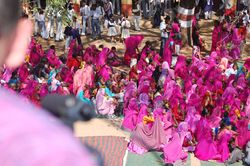 In India, Uttar Pradesh, a woman fights against injustice and male's violence. The woman is Sampat Pal, that founded the Pink gang. Thousands of women now fight together. Pink dressed with a pink stick.
In India, Uttar Pradesh, a woman fights against injustice and male's violence. The woman is Sampat Pal, that founded the Pink gang. Thousands of women now fight together. Pink dressed with a pink stick.
Director: Enrico Bisi
Enrico was born in 1975. He graduated at Turin University in Italy of Literatury and Philosophy. He is an editor and freelance director since 2000.
Production: La Sarraz Pictures, Torino, Italy
Camera: Simon Luca Chiotti
Edit: Marco Duretti, Beatrice Babin
Language of dialogues: Hindi
Language of subtitles: Czech,English
World festival premiere!!!
Russia, 2008, 26 min
Ivan Golovnev
29.01.2011 17:20
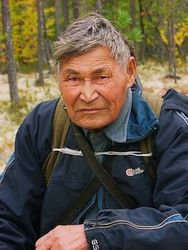 This film takes us into the world of old man Peter Sengepov, tha last surviving Shaman of the Kazym River, who lives alone in the depths of the Siberian taiga. The region of the Khanty people is the basic source of oil recovery in Russia. About 70 percent of all Rusian oil is extracted here. The oil companies actively buy huge territories in the North of Siberia. Indigenous people are compelled to leavethese places, their own patrimonial territories, and do a modern civilization gradually absorbs an ancient culture.
This film takes us into the world of old man Peter Sengepov, tha last surviving Shaman of the Kazym River, who lives alone in the depths of the Siberian taiga. The region of the Khanty people is the basic source of oil recovery in Russia. About 70 percent of all Rusian oil is extracted here. The oil companies actively buy huge territories in the North of Siberia. Indigenous people are compelled to leavethese places, their own patrimonial territories, and do a modern civilization gradually absorbs an ancient culture.
Director, Camera: Ivan Golovnev
Was born in 1978. Graduated at the Omsk State University. In 2002 finished college at the Sverdlovsk Film Studio in Ekaterinburg, department of directors of cinema and TV. In 2005 finished the Highest Courses of Film Writers and Directors in Moscaw. Winner and participant of the international film festivals and film projects.
Production: Ethnographic Bureau Studio, Ekaterinburg, Russia
Edit: Yuri Yatsencko
Language od dialogues: Russian, Khanty
Language of subtitles: English
Awards(selection):
Best international documentary at the International Film Festival CORTOPTERE, Italy 2008
Best international documentary at the International Teheran Short Film Festival, Iran 2008
Prize of the Directorate of the SHAKEN STARS International Film Festival, Kazakhstan2009
Best short documentary at the International "Gold Panda" Awards, China 2009
Special Mention of International Jury at the Festival de Aguilar de Campoo, Spain 2009
Audience Award at the ESPIELLO International Film Festival , Spain 2010
Prize of the Jury at the "Toamna la Voronet" International Film Festival, Romania 2010
Special Mention of the International Jury at the InkaFest Mountain Film Festival, Peru 2010
Special Mention for editing at the XIX International Festival of Ethnological Film, Serbia 2010
Grand prize at the XII "Finno-Ugric World" International Film Festival, Russia 2010
Czech Republic, 2009, 38 min
Jaroslava Bagdasarová
29.01.2011 17:55
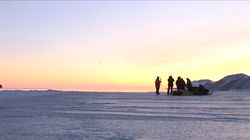 In the far, far North, where the day begins and the oceans meet, a small hamlet New Chaplino is situated. The goverment decided to turn the village into a tourist resort. It is winter, 30 degrees Celsius below zero. The tourists are not coming. There are only few memories of them and the snow has already covered their footprints. The village people live in the cardoard houses. They are waiting for the tourists and dancing. It is only Vika, their country fellow, who is coming to visit her native village after she has spent few years in the city. Thus all villagers keep waiting for the tourists and dancing...
In the far, far North, where the day begins and the oceans meet, a small hamlet New Chaplino is situated. The goverment decided to turn the village into a tourist resort. It is winter, 30 degrees Celsius below zero. The tourists are not coming. There are only few memories of them and the snow has already covered their footprints. The village people live in the cardoard houses. They are waiting for the tourists and dancing. It is only Vika, their country fellow, who is coming to visit her native village after she has spent few years in the city. Thus all villagers keep waiting for the tourists and dancing...
Director: Jaroslava Bagdasarova
The Director Jaroslava Bagdasarova was born in Martin, Slovakia. She graduated in social anthropology at St.Peterburg State University, Russia and in documentary cinema at FAMU, Prague, Czech republic. She is currently working at the research institute in Halle/Saale, Germany.
Production: Pavla Kubečková Company, FAMU Smetanovo náb.2, Praha 1, Czech Republic
Camera: Georgij Bagdasarov
Edit: Libor Alexa
Award: Tococu Lisabon 2010 - první cena
language of dialoques: Russain, Chukchi
Language of subtitles: Czech, English
Slovakia/Macedonia/Slovenia, 2007, 5 min
Sašo Niskač
28.01.2011 18:50
 The short documentary about traditional wedding ceremony in western macedonian village called Galičnik.
The short documentary about traditional wedding ceremony in western macedonian village called Galičnik.
Directors: Sašo Niskač, Barbara Turk Niskač
Production: 3littlewolves
Language of dialogues: No dialogues
Language of subtitles: No subtitles

 High up in the hills of Idaho, USA. Immigrants earn their wages in solitude as the quiet caretakers of thousand of serene sheep.
High up in the hills of Idaho, USA. Immigrants earn their wages in solitude as the quiet caretakers of thousand of serene sheep. “A man is different from a woman. A man is allowed to do more things, a woman to do nothing.” say Oláh gypsies from Békés County Hungary. Traditions based on these kinds of suppositions keep this community firm. Grown Girl means: Mature Woman. Becoming Grown Girl is a turning point.”
“A man is different from a woman. A man is allowed to do more things, a woman to do nothing.” say Oláh gypsies from Békés County Hungary. Traditions based on these kinds of suppositions keep this community firm. Grown Girl means: Mature Woman. Becoming Grown Girl is a turning point.”
 On the basis of a social anthropological case study, this film documents the birth practices of the Bunong in Mondulkiri province, located in the northeast of Cambodia. Social, economic and political changes are transforming the province tremendously and are affecting villagers´ beliefs, perceptions and habits regarding pregnancy, delivery and early motherhood. Traditional midwives, pregnant women, mothers and their families give a personal insight into their present decision-making strategies, which are at the crossroads between tradition and modernity.
On the basis of a social anthropological case study, this film documents the birth practices of the Bunong in Mondulkiri province, located in the northeast of Cambodia. Social, economic and political changes are transforming the province tremendously and are affecting villagers´ beliefs, perceptions and habits regarding pregnancy, delivery and early motherhood. Traditional midwives, pregnant women, mothers and their families give a personal insight into their present decision-making strategies, which are at the crossroads between tradition and modernity. This documentary film is an insight into the lives of eight Czech families or individuals living permanently in Sweden. What has this country given them or taken away? What are their views on leaving Czechoslovakia and living in the North after forty years? How do they and their children who were born here perceive Sweden and the Swedish society? The film does not only peek inside the Czech families but also reveals the atmosphere of Swedish towns and villages and tinges everything with original Czech and Swedish music.
This documentary film is an insight into the lives of eight Czech families or individuals living permanently in Sweden. What has this country given them or taken away? What are their views on leaving Czechoslovakia and living in the North after forty years? How do they and their children who were born here perceive Sweden and the Swedish society? The film does not only peek inside the Czech families but also reveals the atmosphere of Swedish towns and villages and tinges everything with original Czech and Swedish music. Anthony and Robert – youngsters from Nairobi – give insight into their everyday life. With a film camera they document and comment the life on the streets and in the Halfway Centre. Thereby, not only their trials and tribulations are expressed but also their sense of humor and their plans for the future, which are full of hope: Moving images which convince through their authenticity. By handing over the camera to the two protagonist, a dynamic change of perspectives is established. This renders possible a differentiated examination of the subject matter as well as the proceedings of the film.
Anthony and Robert – youngsters from Nairobi – give insight into their everyday life. With a film camera they document and comment the life on the streets and in the Halfway Centre. Thereby, not only their trials and tribulations are expressed but also their sense of humor and their plans for the future, which are full of hope: Moving images which convince through their authenticity. By handing over the camera to the two protagonist, a dynamic change of perspectives is established. This renders possible a differentiated examination of the subject matter as well as the proceedings of the film. Filip is a student at Mac Brod Gymnasium. He stays at the dormitory. Alija is a good friend of him at school. But they relate to different religions and that separate them not only during lunch-breaks at school, but all the time outside school. Filip spends his weekends in his home village Samokov, collecting mushrooms for sale and helping his grandparents and his mother in her small shop. Alija commutes everyday from his home village Plasnica.
Filip is a student at Mac Brod Gymnasium. He stays at the dormitory. Alija is a good friend of him at school. But they relate to different religions and that separate them not only during lunch-breaks at school, but all the time outside school. Filip spends his weekends in his home village Samokov, collecting mushrooms for sale and helping his grandparents and his mother in her small shop. Alija commutes everyday from his home village Plasnica. The compatriotic village of Holuboje was founded in the so called Bessarabia (part of today’s Moldavia) by Czech colonists in 1864. Holuboj compatriots managed to preserve aspects of their language and folk culture, often long forgotten in the Czech Republic, in the manifold national variety of this region. The most extraordinary of all is the folk band which has continuously functioned here for incredible 146 years and which has various Czech songs in its repertoire.
The compatriotic village of Holuboje was founded in the so called Bessarabia (part of today’s Moldavia) by Czech colonists in 1864. Holuboj compatriots managed to preserve aspects of their language and folk culture, often long forgotten in the Czech Republic, in the manifold national variety of this region. The most extraordinary of all is the folk band which has continuously functioned here for incredible 146 years and which has various Czech songs in its repertoire. Věra Fialová was born at the end of the First World War as the out-of-wedlock child of a Czech woman and a Polish man, a Russian prisoner of war. In an old suitcase she keeps her old letters and pictures from the First and Second World Wars. Her memoirs, accompanied by songs from her family repertoire, capture the "small history" - the life story of an "ordinary woman" against the backgraound of the great historical events of the 20th century.
Věra Fialová was born at the end of the First World War as the out-of-wedlock child of a Czech woman and a Polish man, a Russian prisoner of war. In an old suitcase she keeps her old letters and pictures from the First and Second World Wars. Her memoirs, accompanied by songs from her family repertoire, capture the "small history" - the life story of an "ordinary woman" against the backgraound of the great historical events of the 20th century. In India, Uttar Pradesh, a woman fights against injustice and male's violence. The woman is Sampat Pal, that founded the Pink gang. Thousands of women now fight together. Pink dressed with a pink stick.
In India, Uttar Pradesh, a woman fights against injustice and male's violence. The woman is Sampat Pal, that founded the Pink gang. Thousands of women now fight together. Pink dressed with a pink stick. This film takes us into the world of old man Peter Sengepov, tha last surviving Shaman of the Kazym River, who lives alone in the depths of the Siberian taiga. The region of the Khanty people is the basic source of oil recovery in Russia. About 70 percent of all Rusian oil is extracted here. The oil companies actively buy huge territories in the North of Siberia. Indigenous people are compelled to leavethese places, their own patrimonial territories, and do a modern civilization gradually absorbs an ancient culture.
This film takes us into the world of old man Peter Sengepov, tha last surviving Shaman of the Kazym River, who lives alone in the depths of the Siberian taiga. The region of the Khanty people is the basic source of oil recovery in Russia. About 70 percent of all Rusian oil is extracted here. The oil companies actively buy huge territories in the North of Siberia. Indigenous people are compelled to leavethese places, their own patrimonial territories, and do a modern civilization gradually absorbs an ancient culture. In the far, far North, where the day begins and the oceans meet, a small hamlet New Chaplino is situated. The goverment decided to turn the village into a tourist resort. It is winter, 30 degrees Celsius below zero. The tourists are not coming. There are only few memories of them and the snow has already covered their footprints. The village people live in the cardoard houses. They are waiting for the tourists and dancing. It is only Vika, their country fellow, who is coming to visit her native village after she has spent few years in the city. Thus all villagers keep waiting for the tourists and dancing...
In the far, far North, where the day begins and the oceans meet, a small hamlet New Chaplino is situated. The goverment decided to turn the village into a tourist resort. It is winter, 30 degrees Celsius below zero. The tourists are not coming. There are only few memories of them and the snow has already covered their footprints. The village people live in the cardoard houses. They are waiting for the tourists and dancing. It is only Vika, their country fellow, who is coming to visit her native village after she has spent few years in the city. Thus all villagers keep waiting for the tourists and dancing... The short documentary about traditional wedding ceremony in western macedonian village called Galičnik.
The short documentary about traditional wedding ceremony in western macedonian village called Galičnik.